Jorge Lagunas Delgado, 19, of Aurora started working at a pharmacy in high school — he’d applied to Walgreens as a cashier, but the pharmacy there needed staff members, so he began working as a technician.
One day, he overheard the pharmacist he worked for consulting a patient about what medications to take.
“Having that knowledge — something about that clicked,” Lagunas Delgado said.
Lagunas Delgado was also figuring out his next educational step around the same time. He had wanted to go to a four-year university after high school, but the price tag was too high. So he decided on a choice close to home: Waubonsee Community College. While at Waubonsee, he started out undecided about his future career path, but landed on becoming a pharmacist.
Now, in his second year at Waubonsee, Lagunas Delgado is waiting to hear back from the four-year schools he’s hoping to transfer to next fall — especially his top choice, the University of Illinois Chicago.
At Waubonsee, he’s part of a program for low-income, first-generation and students with disabilities that offers academic planning, career exploration, transfer advising and workshops. Advisors at Waubonsee helped him make sure he was meeting the requirements needed to transfer, like taking microbiology because UIC requires it for its pharmacy program, he said.
Community college students like Lagunas Delgado have access to a number of pathway programs and resources that will help them transfer to four-year universities. And now, the University of Illinois system is adding another such program into the mix, that’s meant to increase the number of students in the state who transfer from community colleges to four-year institutions, according to past reporting.
The program, which is in partnership with One Million Degrees, a Chicago-based nonprofit supporting community college students, will provide academic coaching, financial assistance, career services and other support for a cohort of low-income and first-generation college students at select community colleges.
And it’s not the only community college program aiming to reduce barriers to college access — as the University of Illinois pilot prepares to launch, a state proposal to allow community colleges to offer bachelor’s degrees in Illinois is being met with headwinds and opposition from four-year institutions. The governor’s office and supporters from community colleges say such a program could eliminate financial and commuting barriers to students who need to stay close to home and can’t transfer to a four-year institution. Many four-year schools are critical of the proposal.
But, while the four-year degree proposal hangs in the balance, the University of Illinois pilot is set to move forward with its plan to help a selected group of students through their transfer to one of the university’s campuses in Chicago, Urbana-Champaign or Springfield. The first cohort is slated to launch in spring 2026, according to a news release about the program, and the second group in spring 2027.
As of mid-April, One Million Degrees had identified some mid- to larger-sized community colleges that can support 80 Pell grant-eligible students for the pilot program, senior director of academic programs and partnerships at the University of Illinois Gretchen Lohman said in an email statement to The Beacon-News. The pilot program will last for three years, with one community college per University of Illinois school, and then could continue or expand.
The selection process is being spearheaded by One Million Degrees, according to Lohman. Among the factors in selecting community colleges are their geographic location and existing partnerships with U. of I. schools.
The University of Illinois’ enrollment has grown steadily in recent years, according to data from the U. of I. system. In fall 2024, new transfer students made up 4% of its enrollment.
As for the state’s community colleges, transfer was the largest type of program offered per 2024 data from the Illinois Community College Board, accounting for five out of every 10 credit students. And seven out of 10 students who earned a transfer degree or certificate in fiscal year 2024 said they were intending to transfer to a four-year school.
All degree programs at community colleges saw decreases in enrollment between 2020 and 2024, but transfer programs saw an increase in enrollment between 2023 and 2024, per the Illinois Community College Board report from December 2024.
In the Aurora area, the College of DuPage’s total enrollment saw a net increase from 2020 to 2024, despite a dip from 2021 to 2023, and had a total enrollment of over 41,000 in 2024. Waubonsee Community College saw a similar dip, but its enrollment in 2024 remained about the same as in 2020, at around 15,400 students.
For full-time, first-time students who began studying at Waubonsee in 2020, 41% graduated within 150% of the “normal time” for completing the program they were enrolled in, while 21% transferred out, according to data from the National Center for Education Statistics. For the same time frame, the College of DuPage saw 24% of its students graduate and 30% transfer out.
Waubonsee, with campuses in Aurora, Sugar Grove and Plano, and the College of DuPage in Glen Ellyn don’t know whether they’ll be selected for the U. of I. pilot program, but officials at both schools said offering a wide variety of programs can only benefit their students, to add to their existing portfolio of transfer and mentorship programs meant to help make the transfer process easier for Aurora-area students.
The Waubonsee Community College campus in downtown Aurora is one of three for the school, which also has sites in Sugar Grove and Plano. (Steve Lord / The Beacon-News)
Waubonsee, for example, has partnerships with numerous schools to facilitate students’ transfer process: from Aurora University and Northern Illinois University in DeKalb to several Chicago schools, including ones in the University of Illinois system, to out-of-state colleges like Arizona State University. The new U. of I. program would provide one more option, she said.
“Schools that we know students are interested in, such as U. of I., anytime that they are reaching out to us to make transfer easier, we are going to work with them as best we can,” Waubonsee’s graduation and transfer coordinator Sarah Kocunik told The Beacon-News. “Because I don’t want a student to think they can’t come to us because we don’t have a specific agreement.”
University of Illinois also has its own transfer programs — for example, the “U. of I. System Transfer Guarantee” program grants any student who graduated from an Illinois high school, earned at least 36 transferable college credit hours, has a grade-point average of 3.0 or higher in their transferable coursework and meets the university’s English proficiency requirement guaranteed admission to a University of Illinois system school, according to a January news release from U. of I.
The program originally applied only to students transferring from Illinois community colleges, but has since expanded to Illinois high school graduates from colleges or universities nationwide, according to the University of Illinois.
The new U. of I. program might provide “more intentional” mentorship than some of the existing programs, said Justin Hardee, the manager of the College of DuPage’s transfer services center. Like Waubonsee, the College of DuPage offers a number of existing partnerships with four-year schools in Illinois and beyond, including some guaranteed admission programs. These kinds of programs give students “a little sense of ease,” he said.
“There is definitely an information gap that’s there for some students,” Hardee said. “The interesting thing with transfer is there’s not always a unified process. … They’re not required to complete the associate’s degree before they transfer. They could transfer at any time, and, as a community college, we’re here to help students with their goal.”
And different schools have different deadlines, processes and application requirements, Hardee said, which can further complicate the process.
“The transfer process, I feel like, it wasn’t necessarily the hardest thing — the hardest thing really is getting organized for the transfer process,” Lagunas Delgado said about his experience applying. “Making sure you’re keeping on top of your studies, as well as keeping on top of the deadlines needed to submit your application.”
It’s been the same for Liliana Olson, 19, of Wheaton. She’s about to complete her associate’s degree this spring and will be transferring to DePaul University in Chicago with a scholarship.
Figuring out how her credits transfer required “a lot of website-digging,” she said at a transfer event at the College of DuPage recently. “It was a lot of back-and-forth between COD’s website and DePaul’s website.”
But she said DePaul and the College of DuPage having a partnership and transfer guides available helped.
“I think that a lot of stuff was pretty streamlined,” Olson said. “Whereas, I was looking at some other private colleges …and I think that that was a little bit harder if they didn’t already have that … relationship with them.”
Managing deadlines, transfer credits and other logistical details is also an opportunity for “learning self-discipline, and self-dependability,” Evril Bollaboina, 20, of Bolingbrook, said recently. Bollaboina started college at North Central College in Naperville, but transferred to the College of DuPage this year, with plans to transfer back to a four-year university in the fall and study neuroscience or psychology.
“It’s your responsibility to keep up with yourself,” Bollaboina said about the transfer process. “You’ve got to make sure you’re a step ahead of that for yourself, and not expecting … people available to you to help you keep up with everything, or make sure you’re doing everything or have completed requirements.”
But the hope from officials at local community colleges is that programs like the U. of I. pilot can not only help materially bridge some of those gaps and logistical challenges, but also make those deadlines and responsibilities feel a bit less stressful.
“It helps students feel more confident,” Kocunik said about initiatives like the new University of Illinois program. “When students can look on our website, or even parents can look on our website, and say, ‘Well, you know, they’ve got this specific agreement.’ It just adds to that confidence, and it makes their time (at a community college) maybe a little easier because they’re not worrying about, ‘Oh, when I finish here, are there going to be any issues?’”
mmorrow@chicagotribune.com




